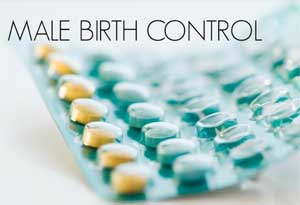- Home
- Editorial
- News
- Practice Guidelines
- Anesthesiology Guidelines
- Cancer Guidelines
- Cardiac Sciences Guidelines
- Critical Care Guidelines
- Dentistry Guidelines
- Dermatology Guidelines
- Diabetes and Endo Guidelines
- Diagnostics Guidelines
- ENT Guidelines
- Featured Practice Guidelines
- Gastroenterology Guidelines
- Geriatrics Guidelines
- Medicine Guidelines
- Nephrology Guidelines
- Neurosciences Guidelines
- Obs and Gynae Guidelines
- Ophthalmology Guidelines
- Orthopaedics Guidelines
- Paediatrics Guidelines
- Psychiatry Guidelines
- Pulmonology Guidelines
- Radiology Guidelines
- Surgery Guidelines
- Urology Guidelines
New effective male birth control pill passes clinical trial of human safety

Second potential male birth control pill passes clinical trials of human safety and tolerability. The good thing about the pill is that it produces contraception without compromising with the libido.
According to researchers at two institutions, a new male birth control pill has passed tests of safety and tolerability when healthy men used it daily for a month, and it produced hormone responses consistent with effective contraception.The phase 1 study results was presented at ENDO 2019, the Endocrine Society's annual meeting in New Orleans, La.
Their results of effectiveness of drug were earlier published in The Journal of Clinical Endocrinology and Metabolism.
The experimental male oral contraceptive is called 11-beta-methyl-19-nortestosterone dodecylcarbonate, or 11-beta-MNTDC. It is a modified testosterone that has the combined actions of a male hormone (androgen) and a progesterone, said the study's co-senior investigator, Christina Wang, M.D., Associate Director, Clinical and Translational Science Institute at Los Angeles Biomed Research Institute (LA BioMed), Torrance, Calif.
"Our results suggest that this pill, which combines two hormonal activities in one, will decrease sperm production while preserving libido," Wang said.
The study took place in 40 healthy men at LA BioMed and the University of Washington in Seattle, Wash. Ten study participants randomly received a placebo capsule, or dummy drug. The other 30 men received 11-beta-MNTDC at one of two doses; 14 men received 200 milligrams, or mg, and 16 got the 400 mg dose. Subjects took the drug or placebo once daily with food for 28 days. The Eunice Kennedy Shriver National Institute of Child Health and Human Development, which is developing 11-beta-MNTDC and other male contraceptives, funded this study.
Among men receiving 11-beta-MNTDC, the average circulating testosterone level dropped as low as in androgen deficiency, but the participants reportedly did not experience any severe side effects. Wang said drug side effects were few, mild and included fatigue, acne or headache in four to six men each. Five men reported mildly decreased sex drive, and two men described mild erectile dysfunction, but sexual activity was not decreased, she said. Furthermore, no participant stopped taking the drug because of side effects, and all passed safety tests.
Effects due to low testosterone were minimal, according to co-senior investigator, Stephanie Page, M.D., Ph.D., Professor of Medicine at the University of Washington School of Medicine, because "11-beta-MNTDC mimics testosterone through the rest of the body but is not concentrated enough in the testes to support sperm production."
Levels of two hormones required for sperm production dropped greatly compared to placebo, the researchers found. The drug effects were reversible after stopping treatment, Wang noted.
Because the drug would take at least three 60 to 90 days to affect sperm production, 28 days of treatment is too short an interval to observe optimal sperm suppression, Wang explained. They plan longer studies, and if the drug is effective, it will move to larger studies and then testing in sexually active couples.
"Safe, reversible hormonal male contraception should be available in about 10 years," Wang predicted.
Wang said most men are open to using this type of male birth control. She cited a multinational survey of 9,000 men published in the journal Human Reproduction in February 2005 that found that 55 percent of men in stable relationships want to try new, hormonal male contraceptive methods if they are reversible.
This experimental contraceptive, 11-Beta-MNTDC, is a "sister compound" to dimethandrolone undecanoate, or DMAU, the first potential male birth control pill to undergo testing by the same research team.
"The goal is to find the compound that has the fewest side effects and is the most effective," Page said. "We are developing two oral drugs in parallel in an attempt to move the [contraceptive medicine] field forward."

Disclaimer: This site is primarily intended for healthcare professionals. Any content/information on this website does not replace the advice of medical and/or health professionals and should not be construed as medical/diagnostic advice/endorsement or prescription. Use of this site is subject to our terms of use, privacy policy, advertisement policy. © 2020 Minerva Medical Treatment Pvt Ltd